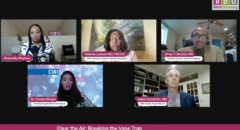
Abuse can be a tough thing to face, especially when the attacker has used sexual means to hurt and degrade another. Sexual abuse is more often spoken about as it relates to women and their attackers, but sexual abuse can happen to men and even children. In the African American community talking about abuse and trauma still seem to be difficult areas to tackle, especially when children are involved.
No matter how much we don’t want to face it, the fact of the matter is Black children are experiencing sexual abuse and it’s flying under the radar. Signs of abuse may be viewed as fatigue, anxiety and other traits that can be attributed to many factors outside of sexual abuse, but there are ways to detect when a child is suffering through sexual abuse and the earlier it is spotted the better.
I had a chance to speak with National Coalition for Sexual Health (NCSH) member and Medical Director for Municipal and Regional Affairs at The Children’s Research Institute, Children’s National Health System Lee Beers, MD about signs of sexual abuse in children, how to interpret the signs and when to seek help.
Tyomi: What are common signs parents can observe in children that may not be vocal about sexual trauma but have experienced it?
Lee Beers, MD: The first thing that must be recognized and acknowledged is that most of these signs are actually vague, so they can mean a number of different things besides sexual abuse. So parents should not panic if they see some of these signs in children. Some of the things that can be a bit alarming are:
-
- sudden withdrawal from favorite activities
- sudden changes and complaints of chronic headaches
- chronic stomach pain...you know things like that.
These signs again can be reflective of a lot of different things so if parents notice them they shouldn’t immediately jump to the conclusion that this is a sign of sexual abuse, but it should alert them to talking to their child a little more carefully about things that could be going on and what might be influencing the way they may be thinking.
Tyomi: So for the parent that isn’t aware of the type of language to use to speak to children about sex in general, how does a parent approach the subject of sexual trauma?
Lee Beers, MD: I think it’s best to really start generally and more broadly and say “Hey I’ve noticed that you haven’t been feeling well lately. Is there anything bothering you or is there anything that you want to talk about?” And most kids including my own may start out saying ugh and sort of shrug. And then just asking more questions like, “Is there anything at school that is bothering you?”, “Is there something happening at an afterschool program or a babysitter?”..."Is there anything happening there that is bothering you?" And if they don’t disclose you can go into more conversation if there is something in particular that you are concerned about. You can even specifically say “Is there anyone that is hurting you?”, “Is there anyone doing anything that is making you nervous or making you feel uncomfortable?”. So those are ways of framing the question that aren’t intimidating but it gives them the opportunity to tell you what’s going on. And then you just follow your child’s cues. If they start to seem like they are in something you can begin asking more detailed questions.
Tyomi: At what point should a parent seek out help and how does a parent go about finding a doctor or therapist to meet their child’s needs?
Lee Beers, MD: I always recommend seeking help sooner rather than later because these are tough issues and parents shouldn’t feel like they are on their own, so if a parent is worried they should seek help. If they have a concern and they have the conversation with their child and their concern is not alleviated, then they should seek help. They can talk to their pediatrician...that is a great first stop. They can talk to their child’s guidance counselor at school or professionals at the school...that’s another great place. Starting with someone the family knows and feels comfortable with and can have these initial conversations with is the perfect first stop. And if further evaluation or further therapy is needed then those professionals can help those families go where they need to go for help.
Tyomi: If a child has been hurt by someone close to him or her, how can a parent go about separating that relationship?
Lee Beers, MD: This is where a parent or a family really needs to work with professionals because every situation is different. Some can actually be fairly dangerous, and so I think that is where really engaging with the professionals who are involved in the case and in the situation especially with law enforcement if law enforcement needs to be brought in, child and family services if they are involved and really just being involved with professionals because each situation is so different and families shouldn’t be expected to figure that out on their own. They should be able to rely on professionals that have expertise in this area.
Tyomi: What are the statistics on how well adults who have experienced childhood sexual abuse function and behave if treatment was sought early on in childhood?
Lee Beers, MD: Again it varies on the situation, but in general a very accurate statement is that the earlier concerns and issues are identified the better. And when concerns or issues are identified the response is really important. So the child feeling like they are supported and relieved and not blamed all of those things are important for improving long-term outcomes. Even if the child seems to be handling it okay I always encourage therapy because these are difficult, complex issues and therapists can work together with the child and the family to work through it. But in general the earlier the better for outcome and the more supportive the response to the child the better.
For more information on how to handle sexual abuse in children and to find sources to help with this issue, visit the National Children’s Advocacy Center at www.Calio.com.
 Glamazon Tyomi is a freelance writer, model and sex educator with a deeply rooted passion for spreading the message of sex positivity and encouraging the masses to embrace their sexuality. Her website, www.sexperttyomi.com, reaches internationally as a source for advice and information for the sexually active/curious. Follow her on Twitter at @glamazontyomi and the all-new “Glamazon Tyomi’s Sex Academy” radio show here.
Glamazon Tyomi is a freelance writer, model and sex educator with a deeply rooted passion for spreading the message of sex positivity and encouraging the masses to embrace their sexuality. Her website, www.sexperttyomi.com, reaches internationally as a source for advice and information for the sexually active/curious. Follow her on Twitter at @glamazontyomi and the all-new “Glamazon Tyomi’s Sex Academy” radio show here.









